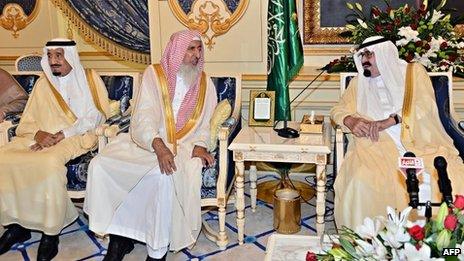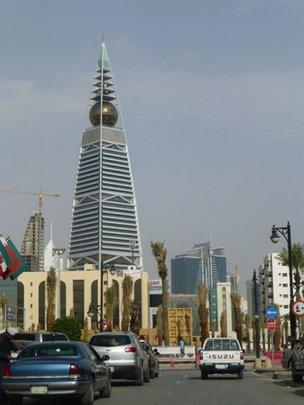MPs question UK relations with Saudi Arabia and Bahrain
- Published
.jpg)
Calls for reform and democracy in Bahrain have not gone away
The government can no longer ignore claims of hypocrisy over its relations with Saudi Arabia and Bahrain, a report by a group of MPs has said.
The Foreign Affairs Committee (FAC) said concerns over human rights were being juggled with the UK's lucrative trade and other strategic interests.
MPs said the Gulf region was critical to the UK, yet many states were among the "least democratic in the world".
But campaign Against the Arms Trade said the report was a whitewash.
In a statement, the pressure group accused the committee of "giving cover to the UK government as it continues the policy of pandering to despicable regimes in its desire to drum up sales for [the defence manufacturer] BAE Systems".
The controversial issue came under scrutiny in a 260-page report.
Poor perception
On calls for reform in Bahrain, the MPs warned that "if there is no significant progress by the start of 2014, the government should designate Bahrain as a 'country of concern' in its next Human Rights Report".
On Saudi Arabia, the MPs said there was worrying evidence that the public there, especially young Saudis, had a poor perception of the UK and likewise the UK population had a negative perception of Saudi Arabia.
The committee urged the government to explain its approach better to the public.
Prime Minister David Cameron has made a concerted effort to strengthen ties with the Arab Gulf states, calling them vital to the UK's national security interests.
But lobbying by Gulf opposition activists and human rights bodies has raised concerns that the UK could be subordinating its purported ethical foreign policy for the sake of trade deals and defence ties.
Addressing Saudi Arabia's much-criticised human rights record, the parliamentary committee rejected calls by some for an arms boycott.
It said there was no evidence that British arms were being misused and that "ending defence sales would have significant costs for the UK-Saudi relationship" and there is "little evidence to suggest it would have any positive effect".
Facing dilemma
FAC chairman Richard Ottaway acknowledged the dilemma facing the government in dealing with the Gulf Arab states.

Saudi Arabia's ruling family is under pressure to introduce more democracy
He told the BBC: "We have to weigh up on the one hand our concerns about the human rights situation in the Gulf, but balance it against our interests and the only way to do that is to be open and honest and to recognise that it's not a perfect world and sometimes interests clash with values."
Annual bilateral trade between the UK and the two Gulf states under review totalled £10.7bn last year and the government is hoping for further sales of its Typhoon jet fighter to both states.
The report said that despite "differences between our societies", the UK was right to maintain strong relationships with Saudi Arabia and Bahrain but it needed to explain itself better both at home and abroad.
The report has taken the committee over a year to compile, taking in dozens of testimonies from both friends and opponents of the ruling monarchies in the two countries concerned.
When the review was first announced last year Saudi diplomats immediately took offence, saying it was "insulting" - an indication of the sensitivity of UK-Saudi relations.
Arab Spring
The convulsions of the Arab Spring that erupted in the region in 2011 threw the UK into a dilemma. Should it support its old friends and allies in the Middle East or go with the prevailing trend and join the clamour for immediate reform and democracy?
In the end the government has tried to steer a middle path, publicly calling for reform and raising some issues behind closed doors but privately reassuring unelected rulers of British support.
No Gulf Arab regimes were toppled and the UK's current ambassador to Bahrain has worked hard to improve relations with the ruling monarchy there after his predecessor was sharply critical of their actions.
On Saudi Arabia, the world's largest oil producer and exporter and a major customer for British defence exports, the report said it had "a poor human rights record".
It noted that the number of executions there had risen from 27 in 2010 to 77 in 2011.
The committee acknowledged that King Abdullah's reforms, starting "from a low base", were improving the position of women, although they are still forbidden to drive cars.
It said Saudi Arabia continued to be a vital but "complicated" counter-terrorism partner for the UK and called on the government to work harder with the Saudis to choke off extremist funding.
It praised Saudi co-operation in stopping a bomb placed by al-Qaeda on a US-bound cargo plane that was discovered at East Midlands airport in 2010.
Oil supplies
The MPs' report described Bahrain as critical to the protection of Gulf shipping lanes through which 17 million barrels of oil are shipped per day.

Saudi Arabia is a huge trading partner for Britain with a questionable human rights record
It said the Royal Navy's use of a base there gave it the ability to operate as far as the Red Sea and Gulf of Aden.
Bahrain, it said, provided basing for four UK mine-hunters that helped keep the Strait of Hormuz clear.
Mr Ottaway added: "Bahrain provides us with a huge strategic platform for military operations in the Gulf and to walk away from that would be to the detriment of Great Britain's interests."
But the report was also critical of the slow pace of reform by the Bahraini authorities. It called for censorship to be relaxed and for opposition groups to have free access to media outlets and to diplomats.
The UK, it said, was viewed by many as "a critical friend" of Bahrain.
But the MPs acknowledged that the UK was also unpopular with elements on both sides of the political divide, with opposition figures upset by UK defence and trade ties with a regime they see as despotic, and with hardline monarchists who resent what they see as its interference and its calls for democratic reform.
- Published21 October 2013
- Published18 September 2013
- Published15 October 2012
- Published20 September 2012